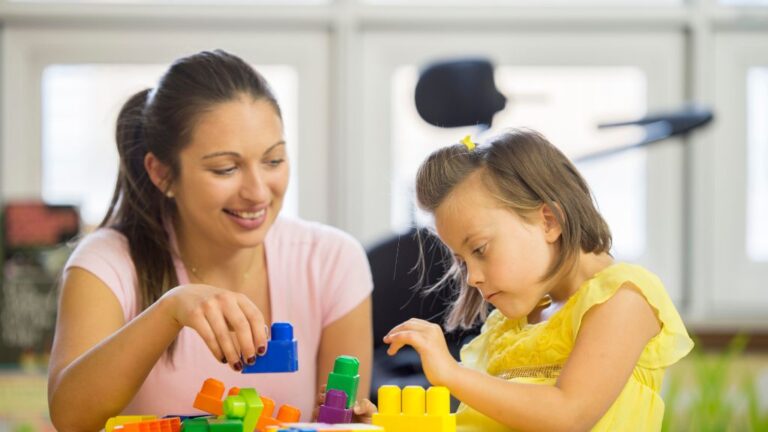Many parents of children diagnosed with autism spectrum disorder (ASD) face various struggles that can complicate daily living. Completing simple tasks can sometimes feel exhausting or even impossible when parenting a neurodivergent child.
Often autism parents approach their child’s pediatricians and providers feeling devastated that their children will never have seemingly “normal” experiences. Parents with a child on the spectrum can find themselves desperate for solutions to problems other parents never consider. Fortunately, options like ABA therapy can help parents navigate this complex terrain.
A challenge many children with autism encounter is difficulty developing fine motor skills. Fine motor skills are essential for completing everyday tasks, including writing, dressing, and self-care. Typically developing children acquire these motor skills organically through play and natural development. Unfortunately, fine motor skills can be challenging for children whose brains function divergently from their peers, like those with ASD.
In Applied Behavior Analysis or ABA therapy, Board Certified Behavior Analysts (BCBAs) and Registered Behavior Technicians (RBTs) positively address the development of these essential skills over time. This critical skill acquisition often improves outcomes for individuals, their families, and communities.
This blog will describe fine motor skills, why they are meaningful, and how ABA therapy can improve this feature in children with autism who may struggle. Additionally, we will explore techniques parents can utilize at home for more practice.
For more information about ABA Centers of Florida, click here.
What Are Fine Motor Skills?
Fine motor skills refer to an individual’s ability to utilize the small muscles in their hands, fingers, and wrists to achieve complicated motions. While these movements seem simple and natural for many, for others, limited functioning in this area leads to higher dependency and hindered autonomy. In simple terms, lacking these skills makes grasping and holding things more complicated, which leads to required support.
Some examples of fine motor skills include picking up small objects, putting on shoes, and clapping hands together. Children with autism often experience challenges with fine motor skills for various reasons, which can impact their daily activities.
Why Do Children on the Spectrum Struggle with Fine Motor Skills?
Research suggests that neurodivergent children struggle with fine motor skills because of weaknesses in areas like muscle tone, motor planning, and sensory processing. Many children on the spectrum struggle with these skills because autism affects the brain’s ability to process and respond to information, particularly visual and tactile information.
Additionally, some children with autism experience anxiety and apprehension when trying new tasks, which may limit participation and desire to engage with the skill acquisition. Lastly, because of the various struggles associated with these new demands, neurodivergent children may feel less motivated to endure new practices which improve skills over time.
Identifying Signs of Delayed Fine Motor Development
Fine motor development is a crucial aspect of a neurodivergent child’s growth as it allows them to perform everyday tasks such as grasping a toothbrush, shaking an object, and feeding themselves. Some signs of delayed fine motor development include:
- Difficulty with hand-eye coordination
- Trouble achieving a pincer grip
- Struggling to manipulate items (grasping/releasing)
- Poor handwriting
- Difficulty buttoning or zipping clothes
- Appearing generally clumsy
While it may be challenging to recognize these signs in some, it is vital to pay close attention to your child’s progress and seek the help of a professional if necessary. By understanding the importance of fine motor development in children with autism, parents and caregivers can take proactive steps to ensure their child’s success. Early intervention can further improve outcomes.
ABA Therapy for Fine Motor Skills
ABA therapy is a highly effective treatment method for symptom management and general development in individuals with ASD. ABA therapy incorporates techniques, including but never limited to shaping, prompting, and reinforcement, to teach children how to acquire new skills, like motor skills, incrementally.
In ABA therapy, ABA practitioners design programs, including interventions that focus on the child’s individual needs, including the development of fine motor skills. ABA therapy targets the development of fine motor skills by incorporating activities that focus on building coordination, finger dexterity, and strength in playful, fun ways.
Over time, children who work on fine motor skills in ABA therapy also improve in self-care, leisure, and academic abilities. Ultimately, ABA therapy seeks to help children gain autonomy and enhance their quality of life. While offering support, ABA therapy also improves home life for the entire family.
What Care Looks Like in ABA Therapy
In ABA therapy, therapists use a multidimensional approach to refine the development of fine motor skills. The ABA therapy plan is individualized for each child, and progress is continually measured and adjusted as needed. Care for fine motor skills in ABA therapy may involve a range of activities, such as:
- Handwriting exercises
- Utilizing tools (i.e., soft scissors, tweezers, and stress balls)
- Building with small blocks
- Manipulating putty or clay
- Sorting small objects
- Drawing letters and pictures with organic shaving cream or other safe substances (always check labels for safety!)
- Shifting objects through substances like sand or plastic balls
These activities help children improve their hand strength and agility in a way that feels less like work and more like play. Additionally, these activities can impact other areas, such as visual perception and executive functioning.
Outcomes Expected in ABA Therapy
The outcomes of working on fine motor skills in ABA therapy are profound for children with autism. This approach helps children develop self-assurance in various aspects of their lives, leading to more developmental expansion and greater participation. Motor skills help improve future employment and independent living experiences. Children who receive ABA therapy tend to have improved hand-eye coordination, better control over fine movements, and improved writing ability over those who don’t, regarding fine motor skills.
Improving fine motor skills can significantly impact a child’s success and overall functioning. Parents, educators, and loved ones can also expect to see the child start to access and interact with their environment in new and exciting ways when receiving ABA therapy.
Incorporating Fine Motor Skill Development into Play and Daily Life
Fine motor skills play a vital role in a child’s development, enabling them to build their self-esteem and independence while exploring the world around them. Incorporating fine motor skills development into play and daily life offers an engaging, effective solution to a difficult challenge. The following activities can help children develop hand-eye coordination, agility, and fingertip control:
- Completing puzzles
- Building structures
- Squeezing play dough
- Drawing
- Painting
These are a few suggestions; you can do almost all at home easily.
Another great way to incorporate fine motor skill development into daily life is by encouraging your child to help with small tasks around the house, like buttoning jackets or stirring ingredients during meal prep. Incorporating these activities into a child’s daily routine can significantly impact their overall development and prepare them to flourish in future settings.
Ultimately, finding creative ways to incorporate fine motor skill development into daily life is a win-win for you and your child, as it offers a fun and effective way to promote motor skills and helps you bond.
Developing Fine Motor Skills in ABA Therapy Leads to a Better Life
ABA therapy is highly effective in helping children with ASD to develop fine motor skills. This scientific approach incorporates various activities that target the child’s needs, helping them acquire new skills. Parents can expect their children to improve while having fun and establishing a fantastic relationship with their ABA treatment team.
Fine Motor Skills in ABA Therapy with ABA Centers of Florida
Fine motor skills are critical to your child’s overall development and happiness. Our trained ABA experts at ABA Centers of Florida understand the significance of fine motor skills and work with your child to refine them through ABA therapy. Our individualized approach toward each child’s unique strengths ensures a comprehensive understanding of their goals and values.
Besides our expertise, ABA Centers of Florida provides a warm and friendly environment that nurtures your child’s developmental growth and curiosity. With our play-based approach, we go to tremendous lengths to ensure your child receives the best care possible while enjoying ABA sessions.
Caregivers who enroll their children in ABA therapy for fine motor skills are allowing them to overcome obstacles and lead fulfilling lives.
Call us at (772) 773-1975 or contact us here to learn more about your options for proven autism care with ABA Centers of Florida.








